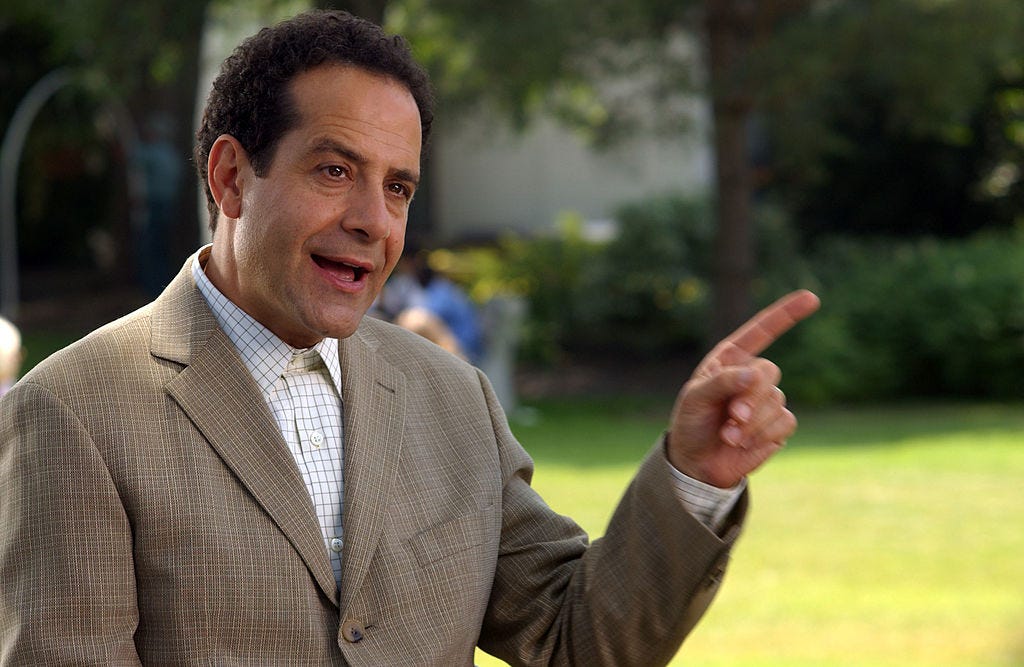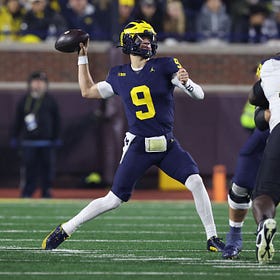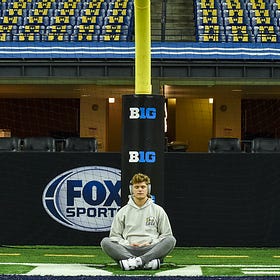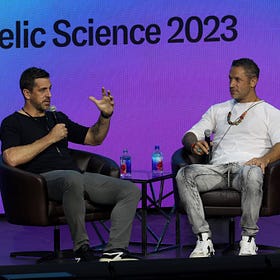One Year of Wide Left: A Reflection, An Offer and a Recap
It's been one year of Wide Left, which is unbelievable. I want to thank you all, provide a special offer and reveal elements of my mental health story. And share my top stories this year.
Yesterday, Wide Left achieved something I thought might not be possible – one year of runtime. I promise I won’t do this every year or after every significant milestone, but allow me the indulgence this one time to reflect on this, my journey, the sportswriting industry in general and my top pieces.
First, a one-year anniversary offer. New readers will have access to a 30-day free trial so they can experience the newsletter just like a paying member, with access to all subscriber privileges, including articles behind a paywall.
I would not mind anyone skipping the thirty-day free trial and subscribing outright, of course.
It is a terrifying thing to turn a hobby into a job, especially as that hobby happens to be something so spectacularly popular that thousands of others also want to turn it into a job. After all, what football fan doesn’t want to be paid to watch football games?
It’s a job that is public – not nearly as public as being a football player, but certainly one with a fair degree of visibility – which means that every mistake is remembered and we’re told by ten thousand people that they could do our job better than we can.
What’s annoying is that maybe fifty of those ten thousand people might be right.
Of course, those fifty people might be right about themselves for a few weeks or even a few months. But one of the most annoying elements of this job is that it can sap someone’s love of football away if they’re not careful.
There are writers I’ve followed who have clearly lost their love of the game but still produce wonderful work. Other writers haven’t and I think it’s evident every time you see Nate Tice geek out about Anthony Richardson’s surprising post-snap diagnosis or Benjamin Solak instantly tracing a play from the third quarter of an already-decided regular season NFL game to one in a college football game from three years ago.
I don’t know anyone in the writing space more excited to talk about backup quarterbacks from the 1980s than Matthew Coller, nor can I match the enthusiasm Trevor Sikkema displays when talking about… anything at all when he’s on air or on his podcasts.
One of my challenges has been to re-find the joy in football after a decade where I had no choice but to watch it and it controlled my income, healthcare and shelter.
Impostor Syndrome
In the modern sportswriting environment, there are enough lanes to occupy that it’s easy to have impostor syndrome about all of them.
I don’t grind the daily beat like excellent beat writers, I don’t have the statistical rigor of data analysts, I don’t have the writing skills of the top feature writers, I don’t have the film background of former players, I don’t have the sourcing background of the best news-breakers and I don’t have the investigative journalism skills of the top reporters in that field.
I hope to, one day, write a piece as emotionally resonant as Jon Krawczynski’s “game recap” of the Minneapolis Miracle, published mere moments after the clock struck triple zero.
I don’t think I ever will.

By the way, impostor is spelled as both “imposter” and “impostor,” a fact that also operates as a cruel joke to play on writers.
The high supply of high-quality or entertaining sports analysts has led to rounds of firings and layoffs every year. As I’m writing this, two more major personalities at ESPN were let go.
What can separate a lot of reporters from fans who can write is not the strength of a reporter’s journalism but their consistency. I have seen dozens of sportswriters whose content I’ve enjoyed fritter away from the space, not because they can’t report well or educate their audiences, but because it’s difficult to do that on Monday and Tuesday and Wednesday and Thursday and Friday. And Sunday. And maybe also Saturday.
Some write more than that. Will Ragatz at Sports Illustrated published 19 pieces between August 7 and August 13. Others, like me, publish less often. In order for that to be sustainable, the quality or quantity of information will need to match up.
It should come as no surprise to my readers that I have spent time gathering data on the Vikings beat as a whole to get an understanding of publishing norms. In that, I’ve found that the average words per day of a beat unit (e.g., the Star Tribune employs two beat writers but constitutes one beat unit) is 1,367.5 during the preseason.
Publishing frequency shows some variance, though beat writers tend to publish at least once a day. I had been worried that my output lagged well behind. While beat writers were writing at least a piece a day and generating anywhere between 1000 to 1900 words per day, I was publishing just barely more than one piece a week.
Luckily, the output seems to be there regardless. The publishing average of 1655.8 words per day is well above the beat average because of the length of my articles. Even over a longer span, with larger dead zones between pieces, the average of 1310.6 words per day is in line with a beat.
Is this too much statistical analysis for what should ultimately be a qualitative exercise? Undoubtedly. The question should be about whether readers are largely satisfied. And thank god, it certainly seems like you are.



I’m sorry if I didn’t include your message in the above gallery. Of note, Substack didn’t seem to offer the option to mark these messages as shareable until October, so if you subscribed in August of last year and left a message, you were never given the ability to say your message could be public!
Nevertheless, I read every message as they come through, and I’ve once again read every message in preparation for this “year-end” review. It’s truly encouraging, in ways that are difficult for me to describe, despite my nominal profession – being a writer.
Thank you.
My Mental Health
The drive to write has, at times, disappeared entirely. Those are difficult moments to push through. I have to publish and still provide interesting content. I’ve done it, and I will do it again.
But the more frustrating moments occur when I have an intense drive to write and simply cannot.
In 2002, I was diagnosed with clinical depression. In 2015, I was diagnosed with obsessive-compulsive disorder. In 2023, I was diagnosed with post-traumatic stress disorder. In 2025, after going through another diagnostic session, I anticipate being diagnosed with attention-deficit/hyperactivity disorder. My therapist has been working with me under that assumption.
Obsessive-Compulsive Disorder
In some ways, I’m lucky – my OCD is not nearly as disruptive as it is for a number of other people. The Star Tribune’s Chip Scoggins has written two incredible profiles of athletes with OCD – Jake Sullivan and Chloe Johnson – that resonated with me. I deeply appreciate Scoggins’ work and the willingness of both Sullivan and Johnson to open up to him.
There’s a difference between a piece of writing resonating with you and a piece of writing knocking your head off your neck like a baseball off a tee. That happened when I read what Eve 6’s Max Collins wrote on Eve 6’s Patreon when he discussed his particular expression of OCD.
I implore everyone to click on that Patreon link (free to all, even those not subscribed to their Patreon) and read what he wrote, which unintentionally extracted part of my brain and put it on display for everyone to consume.
It was as if the act of sitting rocketed a brand new batch of cortisol into my brain because The Doubt came back suddenly and with redoubled force. What if I hadn’t driven back far enough? What if I hadn’t been sufficiently thorough in my checking for an injured or even dead person in the street? It took all my willpower not to leap from my metal folding chair and spring for the door, get in my car and drive back to check again. I told myself I was being wildly unreasonable. I knew I was. That’s the thing with OCD. It’s not that you don’t know you’re experiencing total body panic over a fiction, it’s that the knowledge that you are does nothing to make it stop.
The thought of this first incident haunted me for a long time. It kept me up at night. It made it close to impossible to enjoy anything. It got so bad that I debated walking myself into a police precinct and saying “Hey I might have hit someone with my car but I don't know for sure.”
There is a popular understanding of OCD where those experiencing symptoms are obsessed with routine and cleanliness, but that’s not how it’s always expressed. Indeed, that overwhelming popular perception has made it difficult for many of those who have different types of OCD to get properly diagnosed or taken seriously.

For some, it can be haunting. I have talked to people who are convinced that the way they sent an email is the reason their mom is battling cancer. And I don’t mean necessarily the way they worded an email but rather the way they clicked the send button.
These can seem like funny just-so stories, but the idea that one is responsible for the creeping death of loved ones is anything but amusing; it can be a torturous existence. And the worst part is that it’s not a deficit of rationality – they know that their actions did not logically lead to a disease hundreds of miles away – but they cannot convince their anxieties through mere evidence and reason.
Collins was suffering from the belief that he had run someone over with his car. Not even someone that he saw. The mere possibility that he could be driving his car and run over someone without noticing it drove him wild.
Scoggins wrote that Johnson would wash her hands until she bled. I have experienced that.
In my travel backpack, I have two bottles of hand sanitizer — one is a spray and the other is a gel. At my desk, I have another spray bottle of hand sanitizer. Below my desk, I have a bottle of isopropyl alcohol I use to clean my workspace, often using the Q-Tips I have behind my office wall.
I am still going through the process of identifying the nature of my OCD. Like with Johnson, the anxieties, the need for routine and the ritualistic cleaning increase when I’m fatigued or stressed.
Sullivan could have his day ruined when he saw a piece of paper on the ground or new 90-degree angles in a room. While I do not share those specific triggers, the feeling that the shape of the room could drive someone crazy is very familiar to me.
As a child, I would often spend hours attempting to touch all the corners of a room – even the ceiling corners. Not being able to do so drove my stress levels high enough that I would burst into tears without knowing why.
I knew this was strange, so I would only attempt to touch those corners when I was alone, free from judgment. When I wasn’t alone and this trigger struck, I was irritable beyond belief.
There are those with spiritual or moral components to their OCD – that God is judging them for benign behaviors or that they’re secretly a bad person for reasons that they cannot specify.
The need for routine can be expressed differently for those with OCD, too; for some, it could be related to the spiritual or moral facets of their condition, and for others, it could be related to imaginary harm they might be committing.
For me, it’s much less specific. Something feels wrong.

I go through a process of mental checking fairly often. I’ve seen clips of those with OCD locking and unlocking a door 15 times and that seems to be a synthesis of the need to check and the need for routines to “feel right.”
But for me, I don’t engage in the ritual. Instead, I lock a door and then several minutes later will go through my memories of locking the door to make absolutely fucking sure I locked that door.
Hopefully, I did something different this time so I can distinguish this memory from the last time I locked a door, or I’ll convince myself that my recent memory was actually the memory of a previous day and I’ll have to see if the door is actually locked. Well, the knob won’t move, so it’s probably locked. But, I’ll try to open the door again, just to be sure.
Some of this overlaps with the topic of intrusive thoughts – both a viral meme and a genuine struggle for many suffering with OCD. The difference is that a thought disguised as a whimsical impulse is not remotely similar to a thought pattern assaulting your senses and your being.
Some suffer from intrusive thoughts severe enough that they consider themselves a danger to others – their brain telling them, without their consent, that they should or will stab the person next to them. And nothing they can do wills that thought away.
I won’t share the nature of my intrusive thoughts, but I am lucky to say that they are – most of the time, anyway – much more likely to be one-off impulsive thoughts (in line with what those memes generally are actually about) rather than persistent and truly intrusive thoughts. Most of the time.
Many of my friends with OCD cannot say the same.
The battle between the conscious will of those suffering from OCD and their intrusive thoughts is quite literally one of identity and self-worth. Those who deal with these battles need to convince themselves that these intrusive thoughts – much more than the quirky memes about impulsively dying one’s hair at 3 AM – are not an identity-defining terror.
When our understanding of identity is so wrapped up in our mind — that we are what we think — how can you convince someone with unwanted intrusive thoughts that they are not what their thoughts are?
Hoarding
A lot of people might be surprised to learn that some of those suffering from extreme symptoms of OCD live in squalor. While OCD is often associated with cleanliness – sometimes called Contamination OCD, which I have – it can also be associated with hoarding and many of the people that viewers saw in exploitive reality shows like Hoarders likely suffered from the condition.
The compounding issues with executive dysfunction – a symptom that can make it difficult or impossible to control your cognitive processes, especially in regards to planning or task initiation – make it difficult to see a mess and then clean it up. My executive dysfunction is often triggered by mess itself.
And so the mess grows.
When I was much younger, I would need to be woken up an hour early because my parents knew that the morning routine of brushing my teeth would be delayed by me sitting down and staring at a toothbrush, with toothpaste on it, for anywhere between 15 minutes to an hour.
Now it materializes as someone who looks at a half-written article in a Word document knowing what he needs to write but being unable to write it because the desk is a little messy. Or off-kilter. Or the headphones are in the wrong spot. And being unable to fix the issue that’s been clearly identified as the root cause of the problem.
It’s Not A Superpower, But There Are Sometimes Advantages
In some ways, these symptoms can be useful. Both Johnson and Sullivan used the obsession with routine as a means of developing an advanced technical skillset; Johnson remains a high-level Division I basketball recruit, perhaps the best in the country, despite just now entering the ninth grade. Sullivan is one of the best shooters in Iowa State basketball’s history.
My habit of mental checking has served me well in a journalism career that has a particular focus on statistics and which relies on an accurate reporting of facts. It also means that every purchase decision I make is delayed by hours or even days as I read reviews looking for the most optimal version of a product – even if it’s a loofah.
I regret the loofah purchase. It was not, despite the reviews, the best choice in its product category.
I have an obsession with data hoarding – it’s very difficult for me to delete files off of my computer. As a result, I’ve accumulated a number of hard drives (now organized in Network Access Storage) full of random data – papers I wrote back in college, research I conducted for my high school debate team, video presentations made for classes, and hundreds of hours of football games.
This is, when searchable, remarkably useful. I have managed to cultivate an audience that appreciates a writing style that will reference philosophers that were relevant in the high school and college debate scene 15 years ago and also an audience that likes seeing screenshots of websites from 2006.
I have NFL draft guides going back to 2014 and articles I’ve written for websites that have since died and left no trace behind. That level of data hoarding is sometimes not bad.
When I can find the data I need.
Hoarding has combined with anxiety about the ethereal nature of digital storage. It could all disappear in a moment. So, I invest in backups.
But cloud storage backup solutions are pretty expensive as data needs scale up. And I’m still saving up for more hard drives so I can convert my NAS from RAID 0 to RAID 5 – meaning more secure backup solutions.
So while there are some advantages, it generally has made my life hell. The clay smell from a litterbox heightens the anxieties I receive from Contamination OCD, even when I know the litter has been freshly changed. I often cannot work when I experience it.
My sense of smell is no better than most people’s – and I’ve noticed it’s often worse – but I am more sensitive to small smells that others don’t notice simply because those smells can disgust me.
I do not always know my triggers and I am never fully aware of whether rising anxiety in the moment is a product of something related to OCD, PTSD or some secret third thing.
After talking with specialists, I’ve come to understand that OCD and ADHD are fairly correlated, and the symptoms can have either compounding or muting effects on each other, depending on the context.
ADHD meds, for example, often aggravate OCD symptoms. But for someone with both OCD and ADHD, those same medications can often quell symptoms of both conditions at once. I won’t cop to taking medication I wasn’t prescribed, but I can verify those claims.
It also makes diagnosis somewhat difficult as there’s a lot of overlap between OCD, ADHD and autism.
Post-Traumatic Stress Disorder
It’s bad enough having these issues, but they have since been compounded with PTSD suffered from traumas I experienced from 2021 to 2023. Many people who suffer from PTSD, me included, also experience a sort-of impostor syndrome with this diagnosis.
After all, how can I compare what I went through to what my friend over here, held up at gunpoint, experienced? How do I have the temerity to suggest that my traumas are on par with the terrorism of daily life in Gaza? Of my friends deployed overseas?
So, of course, I checked with multiple trauma experts. I took a battery of tests. I needed to see the number that not only told me I had PTSD but that it was a severe case. And I should have trusted the first expert. Or at least the second expert.
Or the fact that turning on the computer sometimes gave me panic attacks so severe I needed to leave the room and lie down.

It was in this environment that I lost my job, a decade-long relationship and, somehow, my car (2:03:07). Twice (4:14). The first time my car was stolen, my Substack was 12 hours old.
When I launched this newsletter, I mentioned that I had considered retiring from writing about football. I thought about it, but I… am honestly not sure what I would do in that scenario. I do not have a degree — having dropped out for reasons you can probably piece together at this point — or a resume lending itself to a different career path.
You might understand, however, why I felt like I had lost a passion for football writing at the time that I needed it more than ever.
Launching an independent platform means that I’m not just responsible for writing the content, I’m also responsible for setting deadlines, generating ideas, optimizing SEO, website design, editing, marketing and so on.
It is tough to do that without passion.
But still, I moved forward. And the response has been overwhelming. Your support has meant much more than you know in making sure I can turn this hobby, this job, this career, into a passion once again.
Again, thank you.
My Year In Writing
Along the way, I’ve written some pieces that I’m truly proud of. There are pieces that have done well for me that I can’t help but feel have justified the whole enterprise and other pieces that haven’t hit the metrics of a “success” but still felt wonderful to write.
Original Reporting
I’m becoming somewhat well-known for writing pieces about the sportswriting industry itself and how specific companies have failed. I don’t love this beat, but I cannot deny that it has made an impact on people.
The most popular one of those pieces is The Rise and Fall of the Draft Network, detailing a company that not only lost its way in the popular consciousness but experienced a talent drain so extraordinary that it’s difficult to envision how a failure that large could happen.
Mismanagement, allegations of lost pay and even lurid details like The Porn House, with cocaine, headlined the piece.
The Rise and Fall of The Draft Network
From 2011 to 2014, a loose network of young draft enthusiasts known as “Draft Twitter” emerged from the online football space. Draft Twitter represented a paradigm shift, refocusing the conversation around the NFL draft around in-depth analysis and skepticism rather than sourcing and traditional reporting.
In addition to that piece, I’ve recently published an article on the surprising talent exodus at Pro Football Focus, a company at the core of the modern public football analytics movement.
That piece touches on the impact private equity can have on a media operation, though I also discussed that in my piece on the dangerous and possibly inevitable growth of “artificial intelligence” into the sportswriting space.
Along with those pieces on sportswriting, I discussed science journalism and how it failed us when it attempted to cover the S2 Cognition test. There was also a discussion on narrative-building within sportswriting on my piece on Caitlin Clark – now significantly out of date as she has improved rapidly since the publication of that piece.
Analytics and Sports Data
My most consistent topic has been the subject of sports analytics. Sometimes I discuss data as it relates to player performance itself but often I discuss the actual practice of gathering data and finding meaning in it. My top-performing piece on the subject captures this tension pretty well, I think.
Minnesota Vikings' Jonathan Greenard Decision Reveals How Weird Analytics Are
When the Vikings signed Jonathan Greenard to functionally replace Danielle Hunter, there was a small bit of discussion about what Seth Walder, a statistician with ESPN Sports & Info, said in February – especially after it was revealed that the Texans signed Hunter to replace Greenard.
As I say in that piece, “data tells a story about the measurer and the measured.” Some of my favorite pieces I’ve written on the subject didn’t generate a ton of new subscriptions but did create a lot of conversation among those in the industry of sports analytics. That’s true of my piece on my skepticism regarding some of ESPN’s advanced wide receiver metrics.
I took a crack at looking at some advanced metrics on the subject myself when I discussed the Justin Jefferson contract and why I think he’s so far ahead of the rest of the crowd when it comes to playing the position. I also tried to discuss the importance of the left tackle position in my piece on how the Vikings probably underpaid Christian Darrisaw.
A piece on the subject of data analysis that both generated a lot of discussion among colleagues and did well publicly was my take on the Relative Athletic Score – why I deeply respect it but why I don’t use it. I was also proud of my long piece on quarterback clutchness, which tackled a subject I hadn’t seen handled from an analytical point of view.
And I’m pretty proud of the fact that I said that Puka Nacua’s two-game sample of high-level play at the start of the season was not variance as is typical of small-sample phenoms. Getting to say that you believe, with evidence, that a player is more than hype feels fantastic.
More recently my pieces, How Good Is Jordan Love? and Is Jared Goff Good? have earned some traction, especially among fans of the Packers and Lions, who hate those pieces. I’ve also done a fair amount of contract analysis and my piece on T.J. Hockenson’s deal stands out, in my eyes, as a good example of that.
The Consensus Big Board
For the NFL Draft, I’m known primarily for one thing. The Consensus Big Board.
I compiled the draft rankings of 101 analysts to produce a list of the top prospects in the 2024 NFL Draft. In the interest of data transparency and in the hope that sharing more data produces more interesting insights across the industry, the board is itself free.
2024 Consensus Big Board: The Top 300 Players in the 2024 NFL Draft, According to 101 Analysts
This is the Consensus Big Board for the 2024 NFL Draft. As often as possible, I’ve tried to provide it free, without subscription, to as many people as possible. To that end, this piece is free to everyone, as is the data.
Along the way, I also generated some analysis (behind the paywall) using the history of consensus data I have available to me.
What is Variance and Who Are the Most Polarizing Players in the Draft?
What’s the Difference Between a Forecaster Board and an Evaluator Board?
I also used the Consensus Big Board to grade the draft after the fact.
Film Room
But this place is more than just a Substack that publishes or criticizes numerical data. We do some film analysis, too. We have Luke Braun’s Film Room, which has over a dozen pieces where Vikings writer and podcaster Luke Braun discusses what the film tells us about a scheme, a coach, a play or a player.
Luke Braun's Film Room: The J.J. McCarthy Diaries — Figure Skating and the Deep Ball
[Luke Braun originally wrote and published this piece in February as part of a series examining one element of quarterback play from each of the six top quarterback prospects in the NFL draft. I have pinned it to the homepage until Braun completes a more thorough film study on McCarthy]
Here’s a non-comprehensive list of his film rooms over the past year.
Technically not a film room, Braun did delve into medicine in his piece on McCarthy’s meniscus repair.
And though I’ve offloaded a good amount of film discussion onto Braun, I’ve done a little bit of it myself. Perhaps the most well-received piece on that front was my discussion of Brian Flores’ scheme and how it uses blitzing to generate outstanding defense.
One of the first pieces of film analysis published at the site was a collaboration with Cody Alexander at Match Quarters and I’m very happy with it – a discussion about “Big Nickel” and why the Vikings would use that.
Features
There have also been pieces that are more features or reflections on the industry. One of the most popular pieces at this Substack along these lines was also written by Braun, and was one of my favorite pieces to edit — despite my public disregard for him. For the bit.
J.J. McCarthy: The Unbearable Lightness of Quarterbacking
In 1993, Czech tennis star Jana Novotná held the Wimbledon title in the palm of her hand. She led the final set 4 games to 1 with a 40-30 advantage in the 6th game. If you don’t know tennis scores, that means that one more point would give her a decisive 5-1 advantage. She would only need one more game - four more points - to win Wimbledon. It was her serve. This is like having a 28-3 lead in the Super Bowl with the ball in field goal range. Miracle territory.
These reflections have resonated with readers. A more personal one, titled What the Fuck Am I Doing At the Senior Bowl? was a hit with fellow sportswriters and a number of subscribers. I also looked back on Kirk Cousins’ career in my piece, Cousins, Once Removed.
Politics and Culture
Appropriate to the name of the newsletter, Wide Left has also delved into the political. The most widely-read piece on the subject was my piece on the Israel-Palestine conflict, published October 9 2023 – very soon after the attacks on October 7 that triggered the most recent, and soul-crushing, waves of violence.
Israel, Palestine and How We Talk About Violence
Early on October 7, Hamas destroyed the barriers separating the southern portion of the Gaza Strip from Southern Israel, attacking the town of Sderot and killing hundreds and kidnapping others. This act revived the fighting between Israel and Palestine in what,
On that topic, my friend Ben Natan also published a piece about the Palestinian athletes that Israel has killed.
Outside of that topic, I wrote about the politics of the Super Bowl, the mishandling of gender and sport by Olympic sportswriters, alleged racism by NFL media against its employees, an NFL coach discussing society-wide racism and gun violence.
Independent of politics, this space has also occasionally covered cultural issues. The two overlap in big ways, so there isn’t as much to put here, but I want to highlight a few. Although my piece on Aaron Rodgers’ flirtation with conspiracy was just an alright performer, I am extremely proud of it.
Aaron Rodgers' Sandy Hook Conspiracy-Making Is Not Surprising, Even If It's Disgusting
Shortly after news broke that independent presidential candidate and anti-vax darling Robert F. Kennedy had quarterback Aaron Rodgers on his shortlist of vice presidential candidates, CNN published a story revealing that Rodgers shared conspiracy theories about the 2012 Sandy Hook shooting
I also spent time watching an NFL Sunday in a Las Vegas Sportsbook with an experienced gambler.
This is both an analytics piece and a sports culture piece, but I got very mad about the evolution of the MVP discussion when Brock Purdy was functionally removed from the race – even though I never thought he deserved the award.
It’s been a hell of a year. Not only has your support meant I can continue this career, it’s meant I can continue my life.














Happy to be supporting and happy that you continue to be here Arif. Case Cookus.
Speaking as someone without OCD, but with a nasty case of ADHD that went damagingly undertreated during my adolescence, your writing as to the symptomatic and diagnostic complexities of OCD as well as your personal and often harrowing experience was appreciated.
It may be odd to say but just sharing that in a sports-related space, which I’ve disconnected from the part of my brain able to talk about neurodivergence, is very validating in a soace so preternaturally drawn away from what is considered broken.
I’m so happy I subscribed here. To many more. Luke Braun stole my cat and traded her for a Nate Burleson football card and a ball of coke